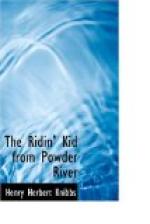Then he remembered that the corral fence was burned, that there had been no horses there when he went to let the chickens out. He followed horse-tracks to the edge of the timber and then turned back. The horses had been stampeded by the flames and the shooting. Pete knew that they might be miles from the cabin. He cut across the mesa to the trail and trudged down toward Concho. His eyes burned and his throat ached. The rifles grew heavy, but he would not leave them. It was significant that Pete thought of taking nothing else from the cabin, neither clothing, food, nor the money that he knew to be in Annersley’s wallet in the bedroom. The sun burned down upon his unprotected head, but he did not feel it. He felt nothing save the burning ache in his throat and a hope that the sheriff would arrest the men who had killed his pop. He had great faith in the sheriff, who, as Annersley had told him, was the law. The law punished evildoers. The men who had killed pop would be hung—Pete was sure of that!
Hatless, burning with fever and thirst, he arrived at the store in Concho late in the afternoon. A friendly cowboy from the low country joshed him about his warlike appearance. Young Pete was too exhausted to retort. He marched into the store, told the storekeeper what had happened, and asked for the sheriff. The storekeeper saw that there was something gravely wrong with Pete. His face was flushed and his eyes altogether too bright. He insisted on going at once to the sheriff’s office.
“Now, you set down and rest. Just stay right here and keep your eye on things out front—and I’ll go get the sheriff.” And the storekeeper coaxed and soothed Pete into giving up his rifles. Promising to return at once, the storekeeper set out on his errand, shaking his head gravely. Annersley had been a good man, a man who commanded affection and respect from most persons. And now the T-Bar-T men “had got him.” The storekeeper was not half so surprised as he was grieved. He had had an idea that something like this might happen. It was a cattle country, and Annersley had been the only homesteader within miles of Concho. “I wonder just how much of this the sheriff knows already,” he soliloquized. “It’s mighty tough on the kid.”
When Sheriff Sutton and the storekeeper entered the store they found Young Pete in a stupor from which he did not awaken for many hours. He was put to bed and a doctor summoned from a distant town. It would have been useless, even brutal, to have questioned Pete, so the sheriff simply took the two rifles and the cartridges to his office, with what information the storekeeper could give him. The sheriff, who had always respected Annersley, was sorry that this thing had happened. Yet he was not sorry that Young Pete could give no evidence. The cattlemen would have time to pretty well cover up their tracks. Annersley had known the risks he was running when he took up the land. The sheriff told his own conscience that “it was just plain suicide.” His conscience, being the better man, told him that it was “just plain murder.” The sheriff knew—and yet what could he do without evidence, except visit the scene of the shooting, hold a post-mortem, and wait until Young Pete was well enough to talk?




